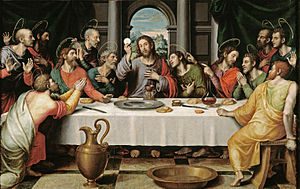
Jesus Christ promises to give this Sacrament (John 6:48-60) and He institutes it Himself (see Matthew 26: 26-28). The Holy Eucharist is the Sacrament in which Jesus Christ is really and physically present under the appearances of bread and wine (1 Corinthians 10:16). We call it the Most Blessed Sacrament because it is Jesus Christ Himself. Our Lord made this Sacrament at the Last Supper, on the night before He died. He gave His Apostles the power to change the bread and wine into His Body and Blood at the Last Supper when He told them, “Do this in memory of me” (Luke 22:19). He intended for His Apostles to hand down this power to others because He wanted all men to eat His Flesh and drink His Blood; ”Amen, amen, I say to you: except you eat the flesh of the Son of man, and drink his blood, you shall not have life in you” (John 6:54). The Apostles handed this power down by making other men bishops and priests through the Sacrament of Holy Orders. The bread and wine are changed by the priest into the Body and Blood of Christ when he says, “This is my Body,” and “This is the chalice of My Blood.” Holy Communion is the reception of the Body and Blood, Soul and Divinity of Jesus Christ in the Holy Eucharist.
To receive Holy Communion worthily you must: be a baptized Catholic; have no mortal sin on your soul; observe the required fast (no solid food-including candy, mints or chewing gum-or drink, except water for one hour before reception of Communion). Catholics are required to receive Holy Communion at least once a year, during the Easter Season. Holy Communion makes the Sanctifying Grace in your soul grow; it unties you with Jesus; it is food for your soul, to help you love God and obey His laws; it is the promise of your resurrection and future glory in Heaven; it weakens your sinful inclinations. After receiving Communion, you should spend some time praying to Our Lord, adoring Him, thanking Him, loving Him and asking His help. To receive Holy Communion unworthily is to take it when there is mortal sin on your soul and to do so is a mortal sin called sacrilege. (See 1 Corinthians 11:27-29).
